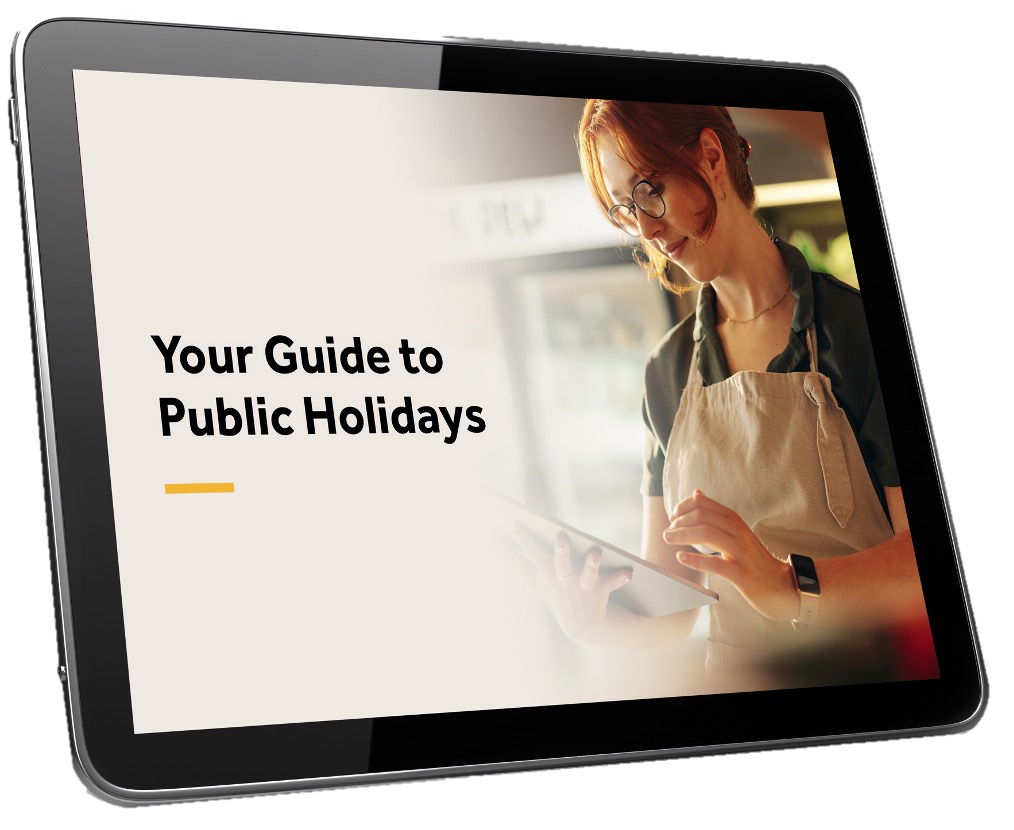
The Easter holiday period is one of the biggest times of the year for small to medium-sized businesses across Australia. According to research conducted in 2022, Australian shoppers were likely to spend a total of $7.1 billion over the festive four-day weekend. This will mean an influx of consumers for businesses and trade which is good news among tough times and a challenging economic climate. However, it is essential to ensure you have enough staff, the rostering is appropriate, and you are paying them the appropriate Easter public holiday pay rates.
You will most likely still need to pay your permanent employees that would normally work on the designated public holiday. However, generally you don’t have to pay them public holiday penalty rates – in most cases you just pay their base rate of pay for the ordinary hours they usually would have worked on that day, unless the applicable award, registered agreement or their employment contract says otherwise. In some cases, you will also have to pay employees, even when they are not rostered on a public holiday. To know for sure, you will have to check the Modern Award or Enterprise Agreement applicable.
If you run a café, or operate in the tourism industry, a public holiday may be your busiest time of year, and you might need all hands-on deck.
Asking Employees to Work on Public Holidays
If your request is reasonable, you can ask an employee to work on a public holiday. The employee can only refuse if the refusal is reasonable or if your request is unreasonable. To determine what is reasonable, you need to consider:
The employee’s personal circumstances, e.g. family responsibilities
Whether they will get more pay, e.g. penalty rates or a higher rate that reflects the expectation of working public holidays
The needs of the business
The type of work they do
Whether their salary includes public holiday work
Whether they are full-time, part-time, casual or shift worker
The amount of notice you gave them about working
The amount of notice they gave you about not working
Sort Your Shifts Out with BrightHR
It’s one of the most important parts of your job, but creating a roster can take hours to do – more than it should. Now with BrightHR, you can create rosters in a matter of minutes.
You can publish, share and modify employee rosters directly from our shift planning software. Your teams will receive an instant notification when a roster is published, via the BrightHR mobile app.
BrightHR also provides one clear view of staff and shifts, and one central source for all your rosters, which you and your employees can view, anytime, anywhere.
Easter Holiday Rates
If employees are working on a public holiday, they may be entitled to public holiday penalty rates. These rates are often much higher than the normal rate of pay.
Modern Awards, Enterprise Agreements or other registered agreements or contracts applicable to your business and the employee will set out the employee entitlements when they work a public holiday.
For example, in the Hospitality Award, the public holiday penalty rate for employees working on a public holiday is 225% for permanent employees. The penalty rate is influenced by the Industrial Instrument, Enterprise Agreement or contractual rate agreed upon, not necessarily the EEs role and the hours worked.
Misconception: ‘I already pay above Award rates, so I’m already covered for penalty rates’
It’s great that you pay above the Award rate, but it doesn’t automatically exempt you from paying penalty rates over Easter. You still have to pay the applicable public holiday rates for an employee who is working a public holiday, but you may be able to pay the employee a higher rate of pay to off-set a certain amount of public holidays, depending on the provisions in the applicable industrial instrument and their employment contract.

Download our Guide on Public Holidays
Learn more about how you can manage your staff during public holidays with this FREE guide.
Easter Weekend Rates: What to Pay?
States may have different regulations in regard to public holidays which fall on a weekend. In some states, a public holiday is scheduled on the following Monday, in lieu of, or in addition to, the public holiday that fell on the previous Saturday or a Sunday. Generally, if a designated public holiday falls on a weekend, then employees should be paid public holiday rates if they work that day.
So, in South Australia for example, an employee should be paid public holiday rates on Easter Saturday, but Sunday penalty rates on Easter Sunday, as Saturday is a designated public holiday while Sunday is not.
Easter Holidays 2023
Ticked cells indicate which days are public holidays in the respective state or territory.
| 2023 date | NSW | VIC | QLD | ACT | |
|---|---|---|---|---|---|
| Good Friday | Friday 07 April | ✓ | ✓ | ✓ | ✓ |
| Easter Saturday* | Saturday 08 April | ✓ | ✓ | ✓ | ✓ |
| Easter Sunday | Sunday 09 April | ✓ | ✓ | ✓ | ✓ |
| Easter Monday | Monday 10 April | ✓ | ✓ | ✓ | ✓ |
| Easter Tuesday | Tuesday 11 April | ||||
| ANZAC Day | Tuesday 25 April | ✓ | ✓ | ✓ | ✓ |
| 2023 date | SA | WA | TAS | NT | |
|---|---|---|---|---|---|
| Good Friday | Friday 07 April | ✓ | ✓ | ✓ | ✓ |
| Easter Saturday* | Saturday 08 April | ✓ | ✓ | ✓ | |
| Easter Sunday | Sunday 09 April | ✓ | ✓ | ||
| Easter Monday | Monday 10 April | ✓ | ✓ | ✓ | ✓ |
| Easter Tuesday | Tuesday 11 April | ✓ | |||
| ANZAC Day | Tuesday 25 April | ✓ | ✓ | ✓ | ✓ |
*Easter Saturday is known as Saturday before Easter Sunday in Victoria, and The day after Good Friday in Queensland.
Tasmania is the only state in Australia to observe the Tuesday after Easter as a public holiday and its only observed by the public sector in Tasmania. As Easter Sunday is not a public holiday in Tasmania, it is a trade-off day.
This blog has been compiled on the basis of general information current at the time of publication. Changes in circumstances after publication may affect the completeness or accuracy of this information. To the maximum extent permitted by law, we disclaim all liability for any errors or omissions contained in this information or any failure to update or correct this information. It is your responsibility to assess and verify the accuracy, completeness, currency and reliability of the information on this website, and to seek professional advice where necessary. Nothing contained on this website is to be interpreted as a recommendation to use any product, process or formulation or any information on this website. For clarity, Employsure does not recommend any material, products or services of any third parties.
